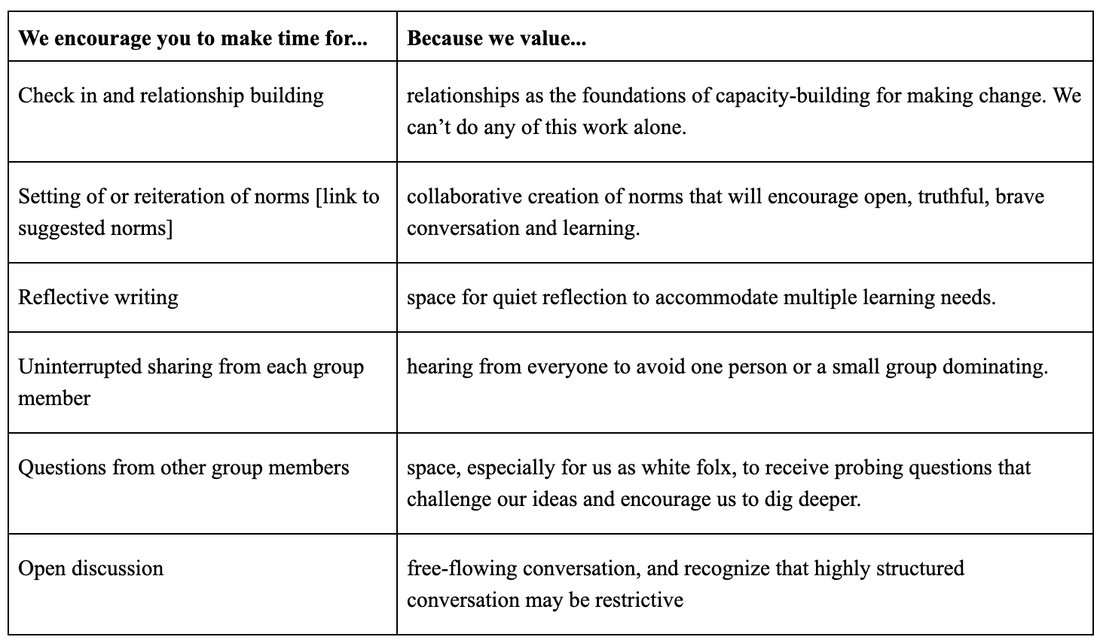- About Us
-
Inquiry Series
-
Current Year 23 - 24 School Year
>
- June: End of Year Reflection
- May: How do we support students of color navigating admissions processes?
- April: How do we support students and teachers when they face backlash for speaking out for racial justice?
- March: How can we find inspiration in white antiracists currently doing this work?
- February: How can we learn from white anti-racists of the past?
- January: How can you build solidarity across differences?
- December: How do we give ourselves space to process when we feel stuck/overwhelmed/enraged?
- November: How do we fight back against attacks on racial and gender justice education?
- October: Why is it important to understand both the history of CRT and what it has come to mean?
- September: How do we keep the focus on race as we engage in antiracist reflective practice?
- Previous Inquiry Series
- Inquiry Resources >
-
Current Year 23 - 24 School Year
>
-
Summer Events
- Writings
We believe that in order to have a fruitful group discussion, it’s helpful to use a structure which allows for each participant to share and listen, and which pushes participants to reflect deeply.
Previously we have offered up one protocol to guide BARWE discussions. We’ve reflected with our MEC partners this year about how antiracist work is not one-size-fits-all, that imposing “only one right way” of doing things is often a manifestation of white supremacy culture, and that most paramount in antiracist work is paying attention to our relationships and our context. Therefore, we encourage you to think about and experiment with what protocols work best for your context, or what tweaks you need to make to a protocol to make it work for you. We offer instead some sample protocol options as well as the following philosophy on how and why to structure a discussion.
We believe no matter what discussion protocol you use, it’s important to give time for the following:
Previously we have offered up one protocol to guide BARWE discussions. We’ve reflected with our MEC partners this year about how antiracist work is not one-size-fits-all, that imposing “only one right way” of doing things is often a manifestation of white supremacy culture, and that most paramount in antiracist work is paying attention to our relationships and our context. Therefore, we encourage you to think about and experiment with what protocols work best for your context, or what tweaks you need to make to a protocol to make it work for you. We offer instead some sample protocol options as well as the following philosophy on how and why to structure a discussion.
We believe no matter what discussion protocol you use, it’s important to give time for the following:
Recommended Discussion Protocols
BARWE Series 1 Protocol:
The National School Reform Faculty Harmony Education Center has dozens of useful protocols, and we encourage you to visit their website if you’re looking to try something new for your BARWE group.
BARWE Series 1 Protocol:
- Opening Reflection
- Give everyone a chance to write and reflect on the article and questions at the start of the session. You can also ask people to do this in advance and bring their reflections with them. We don’t recommend starting without giving everyone time to reflect individually first. (Suggested time: 10 minutes)
- Give everyone a chance to write and reflect on the article and questions at the start of the session. You can also ask people to do this in advance and bring their reflections with them. We don’t recommend starting without giving everyone time to reflect individually first. (Suggested time: 10 minutes)
- Sharing and Questioning Cycle
- Person 1 shares their reactions and reflections on the article and questions (Suggested time: 2-3 minutes)
- Others ask questions of Person 1 and Person 1 answers (Suggested time: 5 minutes)
- Rotate through the group members following the Share-and-Question structure
- Key point: Other group members should limit their reactions to each Person’s reflection with only questions, not statements. This can feel unnatural, and it’s good to acknowledge that. The purpose of question-only is to give each participant a push to dig deeper, and to encourage other participants to actively listen rather than just thinking about their own response
- It is recommended that you split into groups of 2-4 people for this portion, so that everyone can have a chance to share and discuss. If you have limited time, use smaller groups.
- Person 1 shares their reactions and reflections on the article and questions (Suggested time: 2-3 minutes)
- Open Discussion (Suggested time: 10 minutes)
- If you have a larger group, this would be the time to bring the small group discussions back together.
- If you have a larger group, this would be the time to bring the small group discussions back together.
The National School Reform Faculty Harmony Education Center has dozens of useful protocols, and we encourage you to visit their website if you’re looking to try something new for your BARWE group.
